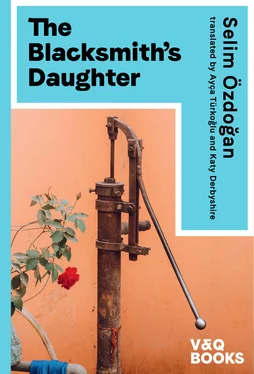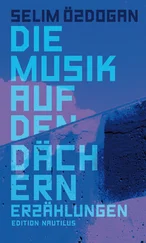At school, it was so cold that the firewood ran out. Every day, two children had to bring wood from home, but even then, it was never really warm in the classroom. Fatma spoke to Timur, and one day he rode to the school, taking as much wood as his donkey could carry. Many of the children had fallen ill by then, and the children from the surrounding villages sometimes stayed home because the snow had blocked the roads, and when they’d burned through the blacksmith’s wood in no time at all, the teacher shut the school until the snow queen’s crown finally shattered; until the snow melted.
Early one morning in the first days of the thaw, Sibel was born. Gül had gone to bed the night before, and when she woke, she had a little sister; a tiny, ruddy little sister, small enough that Gül thought she would probably fit inside her own little belly. Her mother’s belly had been so big and her sister was so small. Sibel.
Melike glanced at the new arrival only briefly, apparently uninterested. She was much more interested in breakfast being ready at last and in all the hubbub at the house. People were coming and going, there were well-wishes and little presents, and Timur said again and again: ‘Her hands and feet are normal, thanks be to God.’
Good wishes rained down from friends and neighbours: May she be healthy, may she always have her mother and father, may she be granted a long and happy life .
By the time Sibel was 40 days old, the snow had melted, the brooks and rivers had burst their banks, the sun was warm – and sometimes Timur sat in front of his house and closed his eyes, rubbed his neck under his coat collar, then held his head still and enjoyed the warmth on his face. And soon the birds were singing, the trees were coming into bud; he had another daughter, named after a fertility goddess. Life was always getting bigger and it had no banks to burst like a river. It simply grew – it grew like his children, and one of these days his life and his heart would grow so big there’d be room inside for everyone, his friends and his foes; there would even be room for Tufan, who’d snitched on him to the gendarmes.
But in the last few days he’d felt a little weak, like he was coming down with the flu. He hadn’t had the slightest cold all winter long, so he couldn’t understand why he now felt weak and drained, and every morning it got worse, not better. One day his limbs were aching so badly that work was out of the question. Even his clothes made his skin smart, so he left the forge not long after he’d arrived, had a glass of tea at the teahouse and then went to the baths to sweat out the sickness. The next morning, he could hardly get up; he dragged himself to the forge but all he did was spend the day at the teahouse, sitting there in a daze.
‘You’ve not looked at all well these last few days,’ Fatma said that evening.
‘I think I’m getting sick.’
Fatma felt his forehead.
‘I’ll make you some broth, you’ve got a bit of a fever, and tonight we’ll wrap you up nice and warm and you’ll just sweat it out.’
Timur didn’t mention that he’d been to the baths, but that night he sweated again. Fatma gave him fresh pyjamas, and when he was changing by the light of the petroleum lamp, she saw reddish blotches on his chest and back.
‘Timur,’ she said, ‘you should tell the doctor about this, it doesn’t look like a cold.’
Timur looked down and he saw the blotches too, if not as clearly as Fatma did. He was completely dazed; everything appeared to him as if through a haze which wouldn’t clear, no matter how much he shook his head or rubbed his eyes.
But he said: ‘Nonsense, what’s the good in seeing the doctor? You’ll see, in two days I’ll be well again.’
Two days later his fever was even higher. He no longer had the strength to stand, and in his rare lucid moments he listened for his heart. It seemed to be beating very slowly. With each day, his fever worsened, and the rattle on his lungs was enough to frighten Fatma. Through a farmer who had business in the town, she got a message to her mother-in-law about her son’s condition. And she made no secret of the fact that she had begun feeling ill herself and feared she would soon be unable to tend to Timur and the children.
The very next day, Zeliha had the whole family brought from the village on a lorry. Timur was so weak that the driver had to help him up into the cab. His fever had raged uninterrupted for over a week, and now he had diarrhoea too. His skin was yellowy and seemed stretched over his cheekbones, his shoulders fell forward wearily, he could no longer stand upright, and there was a glint in his eyes, a crazy, if exhausted glint.
Melike and Gül had only ever seen him lying down to sleep, and now they were both silent at the sight of the weakened man they knew had once been able to carry them both with no effort at all.
The whole way to the town, no one said a word. The only sounds were the hum of the lorry, matches being struck and the driver taking a deep drag. Fatma felt dizzy and unwell, and a few times she tried to ask if they could stop for a moment, but then her stomach seemed to settle again and the queasiness was bearable.
‘Typhoid,’ the doctor said. ‘I assume it’s typhoid.’
‘Are you feeling ill too?’ he asked Fatma, who gave only a slow nod as an answer.
‘It’s an infectious disease. You’ve come from a village?’
‘Yes.’
‘Do you have a toilet? Or do you go in the bushes? Typhoid is transmitted by gut bacteria.’
‘We do have a toilet, yes. The only one in the village… Is it dangerous?’
‘It’s not not dangerous,’ the doctor said. ‘Take your children to relatives; it doesn’t look like they’ve caught it. It’s almost the last stage of the illness, your husband will probably be over the worst in a few days. He has a robust constitution, don’t worry.’
Zeliha sat at the head end of the bed and dabbed her son’s brow, shiny with fever. Once the doctor had packed his bag and left, she said to Fatma: ‘Take the children to Hülya’s, they’ll be well looked after there.’
Hülya had married a prison guard last spring, but she still wasn’t pregnant. In the coach with her daughters, Fatma had to ask the coachman to pull over. She got out and vomited by the side of the road. The coachman gave her a sip of water after she’d wiped her face with her handkerchief. Melike and Gül sat in the coach, watching in silence. Their little sister lay between them, asleep.
‘Are you ill too? Does it hurt?’ Gül asked her mother.
She wanted Fatma to say that there was no need to be scared, that everything would be fine. She didn’t understand what was happening, and she wanted her mother to make the world smaller with her words, to tear it into pieces that didn’t seem so threatening, pieces she could grasp.
‘No, my darling, it doesn’t hurt. I think I’m getting ill but it’s nothing bad.’
‘Are we going to Auntie Hülya’s?’
‘Yes, I’m taking you to Auntie Hülya and Uncle Yücel. You’ll just stay there for a few days. And be good, alright? Look after your sisters, Gül. We’ll come and pick you up soon, and then we’ll all go back to the village together. Your father is sick, but there are doctors here in town. We’ll get better and then we’ll go back to the village.’
Hülya welcomed them very warmly. She kissed her sister-in-law and the girls, made tea and offered pastries, but Fatma wouldn’t stay.
‘I must get back,’ she said. ‘I have to be with Timur. Please take good care of the girls. Keep both your eyes on them so I don’t have to keep looking around.’
‘Don’t you worry.’
Fatma kissed Gül and Melike, and just as she was about to kiss Sibel, the baby started screaming, and Fatma said: ‘I want to feed her one last time.’
Читать дальше












